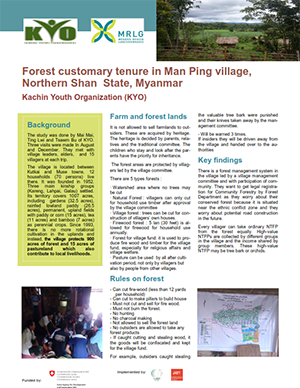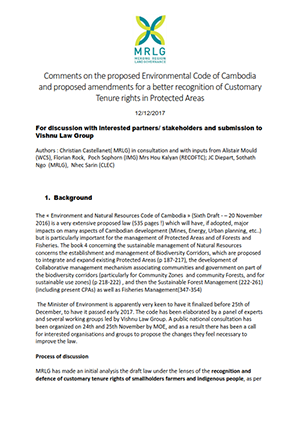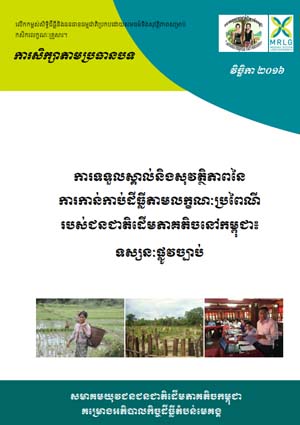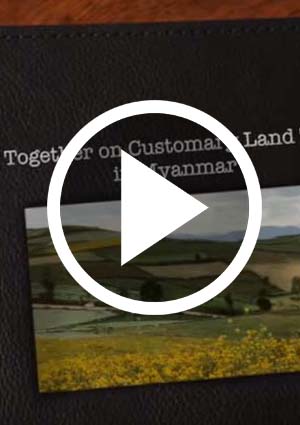droit coutumier
AGROVOC URI:
“As a husband I will love, lead, and provide:” Gendered access to land in Ghana
Improving women’s access to land is high on the agricultural policy agenda of both governmental and non-governmental agencies. Yet, the determinants and rationale of gendered access to land are not well understood. This paper argues that gender relations are more than the outcomes of negotiations within households. It explains the importance of social norms, perceptions, and formal and informal rules shaping access to land for male and female farmers at four levels: (1) the household/family, (2) the community, (3) the state, and (4) the market. The framework is applied to Ghana.
Smallholders and land tenure in Ghana: Aligning context, empirics, and policy
For decades, policymakers and development practitioners have debated benefits and threats of property rights formalization and private versus customary tenure systems. This paper provides insights into the challenges in understanding and empirically analyzing the relationship between tenure systems and agricultural investment, and formulates policy advice that can support land tenure interventions. We focus on Ghana, based on extensive qualitative fieldwork and a review of empirical research and policy documents.
Propiedad colectiva de la tierra en Sudamérica, desafíos y perspectivas
Entre el 23 de octubre y el 02 de diciembre de 2016, el IPDRS y el Land Portal, llevaron adelante un foro debate en línea sobre la Propiedad colectiva de la tierra en Sudamérica, desafíos y perspectivas, buscando alimentar la discusión que actualmente proviene de toda una dinámica global desde ONG, centros de investigación, activistas, universidades, colectivos y claramente organizaciones campesinas e indígenas que plantea todo un esfuerzo mundial para defender la propiedad colectiva de la tierra desde sus distintas dimensiones ante las presiones y amenazas provenientes del agronegocio y de
WORKSHOP 5: THE DIFFICULTIES OF WOMEN’S ACCESS TO LAND AND NATURAL RESOURCES
Throughout the world, the vast majority of women are faced with conditions of access to land and control of land and natural resources that are unequal to those of men.
Social relations have trivialized the fact that they are entirely in charge of domestic work and the education of children, which prevents them from devoting themselves as much as men to agricultural activities. In the fields, they are the forced laborers of the family and take on the often less valued tasks, considered as part of their domestic obligations. As a result, they generally receive no income.
ATELIER 5 : LES DIFFICULTES D’ACCES DES FEMMES À LA TERRE ET AUX RESSOURCES NATURELLES
Partout dans le monde, l’immense majorité des femmes fait face à des conditions d’accès et de contrôle de la terre et des ressources naturelles inégales à celles des hommes.
TALLER 5: LAS DIFICULTADES DE ACCESO A LA TIERRA Y A LOS RECURSOS NATURALES PROPUESTAS PARA LAS MUJERE
Por todo el mundo, la inmensa mayoría de mujeres se enfrenta a condiciones desiguales de control y acceso a la tierra y a los recursos naturales respecto a los hombres.
Forest Customary Tenure in Man Ping Village, Northern Shan State, Myanmar
The poster presents an overview of forestland, livelihoods and customary practices in Man Ping Village, Northern Shan State, Myanmar. This poster is one of a five village case studies produced by partner organizations during field-based training on how to document customary tenure systems, supported by MRLG.
Documenting Customary Tenure in Myanmar: A guidebook (First Edition)
This guidebook provides conceptual, legal and practical tools and resources to help civil society organizations guide communities through the process of documenting customary tenure at the local level. It also provides suggestions for how to build on the momentum generated by the documentation process to develop strategies and actions to defend, strengthen and promote customary rights at community, regional and national level. The guidebook was developed out of practical experience and conversations with local groups in Myanmar that have been documenting customary tenure.
Comments on the Proposed Environmental Code of Cambodia (V6) and Proposed Amendments for a Better Recognition of Customary Tenure Rights in Protected Areas
The « Environment and Natural Resources Code of Cambodia » (Sixth Draft – – 20 November 2016) is a very extensive proposed law (535 pages !) which will have, if adopted, major impacts on many aspects of Cambodian development (Mines, Energy, Urban planning, etc..) but is particularly important for the management of Protected Areas and of Forests and Fisheries. The code has been elaborated by a panel of experts and several working groups led by Vishnu Law Group. A public national consultation has been organized by MOE in Dec 2016.
The Recognition and Security of Customary Tenure of Indigenous Peoples in Cambodia: a Legal Perspective (in Khmer)
This short thematic study challenges the assumption that the legal framework to recognize and protect indigenous peoples’ (IP) customary lands is adequate and that the challenge lies in its implementation. With support from MRLG, a core group of IP NGOs of the Cambodia Indigenous Peoples Alliance (CIPA) held a series of seminars to scrutinize this legal framework, identify gaps and make recommendations for a revision of the supporting legal framework. The thematic study documents this joint reflection.
Customary Tenure in Myanmar
This video is based on the combined efforts of 5 civil society organizations and ethnic youth organizations (88 Generation, Point, FLU, KYO&TSYU) to document local Customary Tenure practices in different villages throughout the country, in the states of Shan North, Shan South, Magwe and Kayah, with the support of MRLG. It’s explains how they implemented the documentation of Customary Tenure practices. The video also explains what customary tenure is, based on the local communities point of view and practices, and why CT recognition is important to them.











